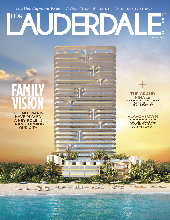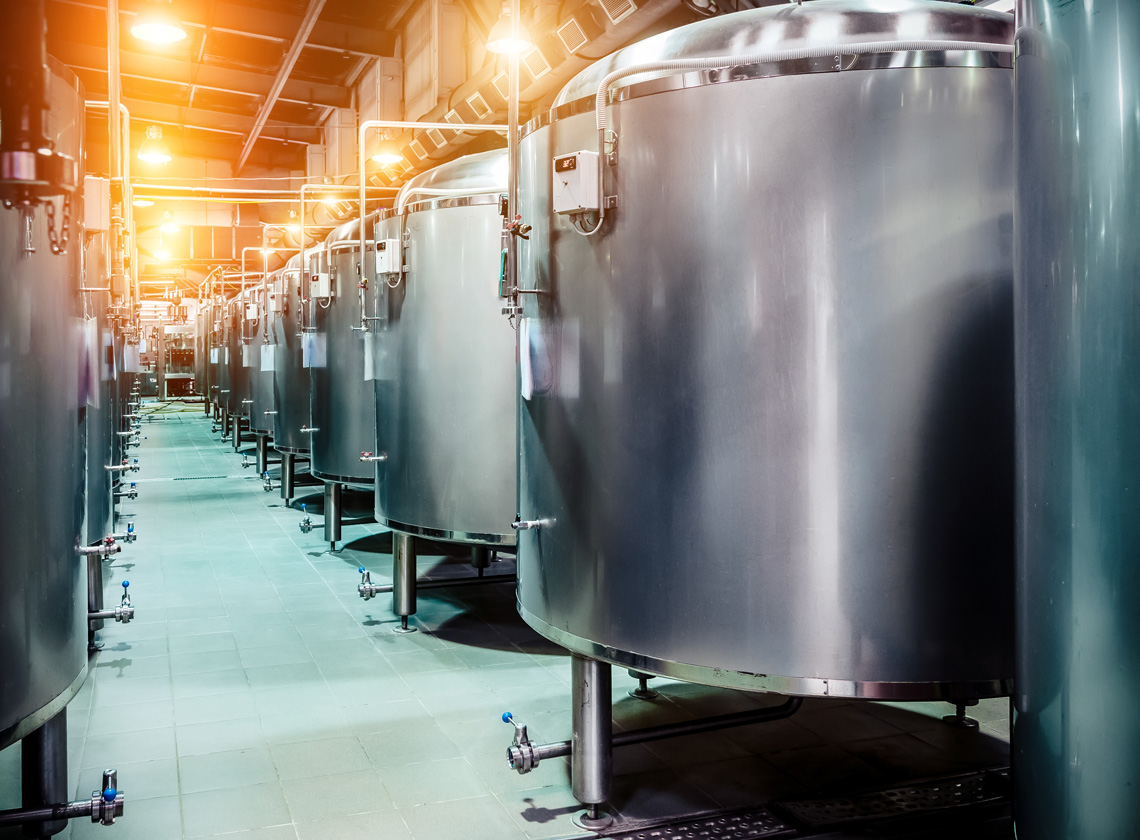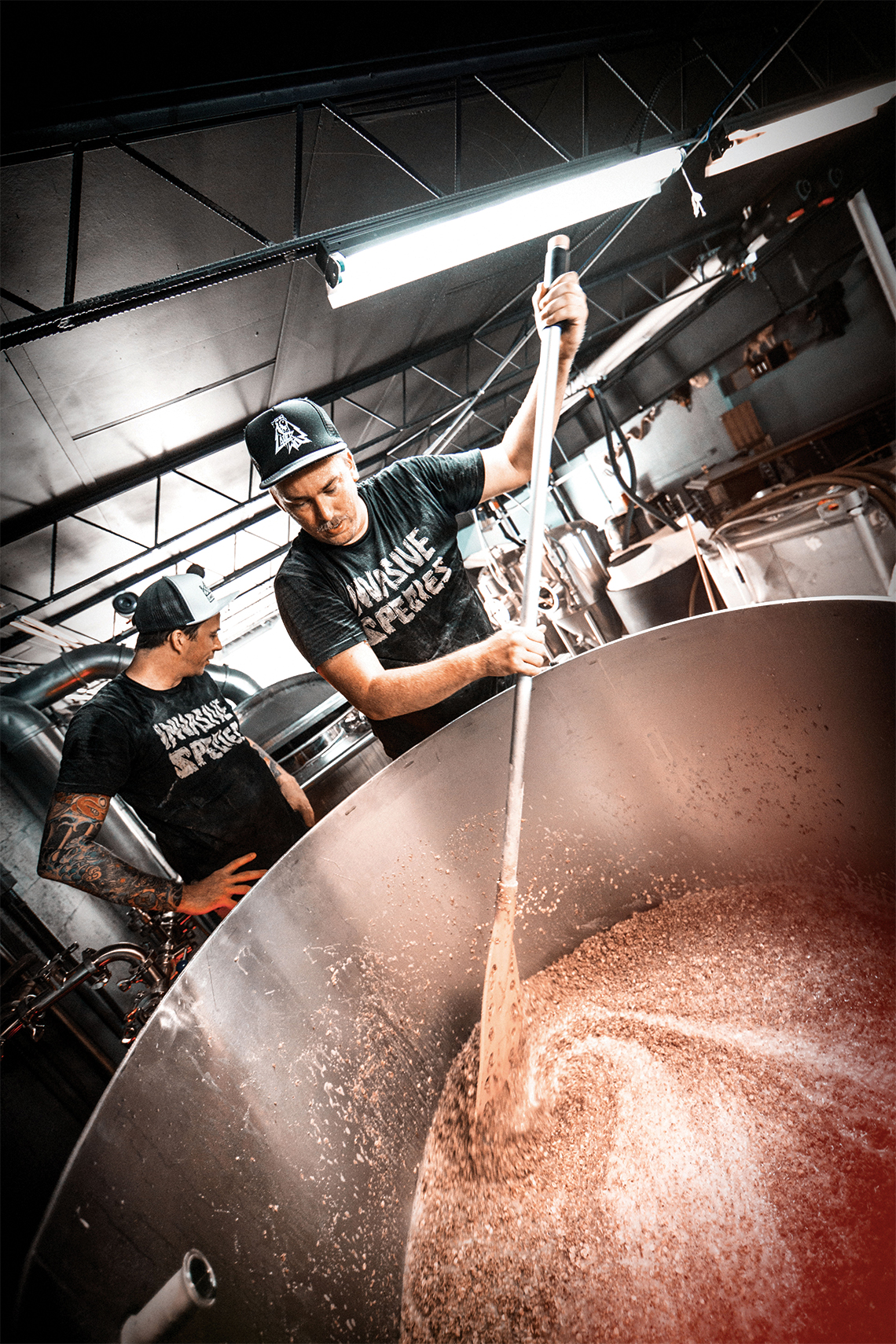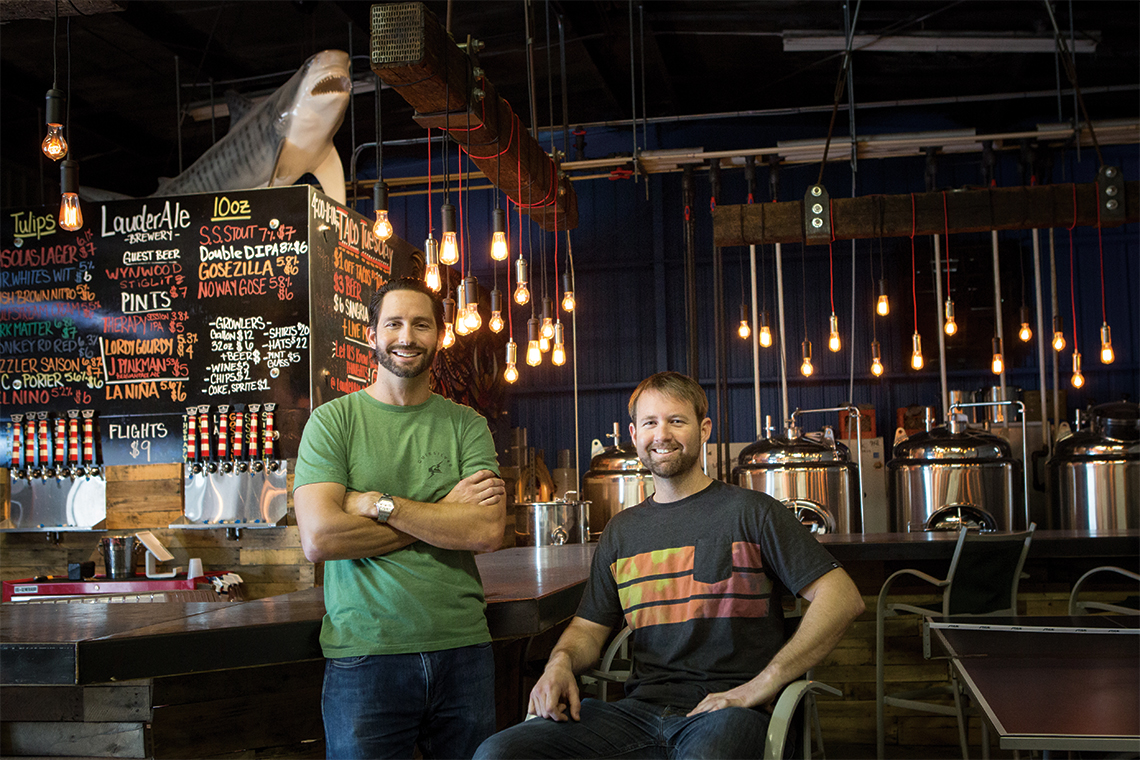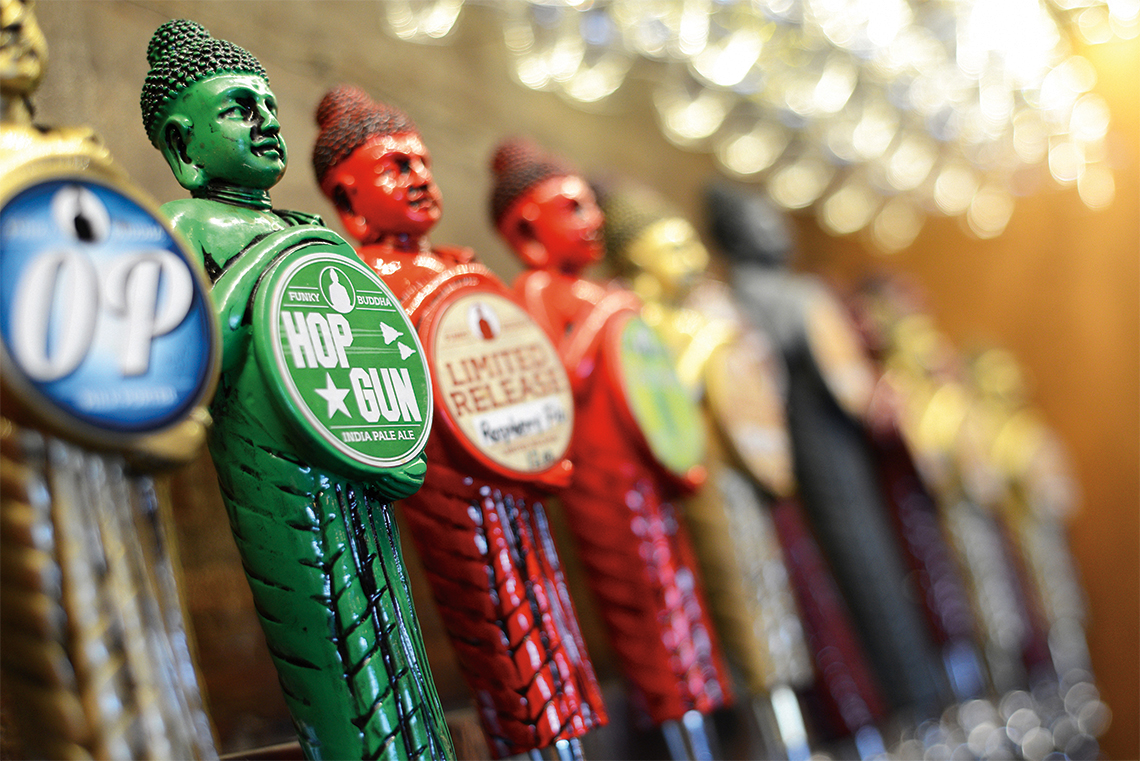At Tarpon River Brewing, there’s a house inside a brewery in a warehouse.
Inside the old-Florida house is a bar, with big windows overlooking the entire brewing operation. There’s even a patio where your dog or kid can sit with you. It’s just like home.
And it’s what Adam Fine had in mind.
“It’s everything I wanted it to be,” Fine says. “[I have] the freedom at will to brew what I want.”
That freedom is nearly two decades in the making. Fine is director of brewing operations — or hoperations, as they call it — at the brewery he’s opened with Riverside Market’s Julian and Lisa Siegel and The Restaurant People. It’s a long way from his beginnings as a brewer – brewing as a hobby in the late ’90s. Back then, Fort Lauderdale was a ghost town for craft beer.
“At the time, we saw craft breweries pop up, but they don’t exist anymore,” he says. “They spent the whole day brewing beer and then had to go out and sell it. [But] beer distributors didn’t understand craft beer.”
Luckily, consumers do. At least now, more than 20 years after Fine helped start a revolution. Today Tarpon River is one of a growing number of breweries springing up around the city. And somehow, they all work.
Fort Lauderdale Then
Fine is from an early generation of brewers. Others around town call him the godfather of craft beer. He grew up liking beer and after moving back to South Florida in the late ’90s, he wanted to see craft breweries the same way he did in Houston, where he’d been living. He and his dad wanted to open a brewery, but quickly discovered it wouldn’t work.
“Dad and I realized no one in the late ‘90s knew too much about craft beer,” he says. “We were fighting a battle.”
The battle was a huge disconnect between brewers, distributors, and restaurants. Brewers wanted to make craft beer, but distributors didn’t understand them. Bars and restaurants didn’t like them. Instead of opening a brewery, Fine started a distribution company, Fresh Beer. It became the largest craft beer distributor in South Florida.
Mike Jurewicz runs MikeLovesBeer.com, where he blogs about craft beer around South Florida and on his travels. He’s been writing about beer for 10 years — first as a hobby when he was just learning about craft beer and then later when he was brewery operations manager at Due South in Boynton Beach. Even a decade ago, the craft beer community was different.
“Overall it has changed drastically,” says Jurewicz, who lives in West Palm Beach. “We only had a handful of brewpubs. I don’t think there were any production breweries that long ago.”
People found out about craft beer from other people. That’s how Jurewicz discovered it. It has a great grassroots, word-of-mouth spread.
“It reminds me of underground music that never had multimillion-dollar ad campaigns,” he says. “You always heard about it from a friend who had a friend. Beer was kind of like that for a while.”
Restaurants didn’t know what to do with it. Jurewicz says no one would go into a place and ask for something that wasn’t mainstream.
“Now, bars have a selection of craft beers,” he says. “Ten years ago, people wanted Bud Light and Miller Lite. Change has happened.”
Fort Lauderdale Now
And change continues to happen. Fort Lauderdale might not have a brewery on every corner like some of the big beer cities, but we’re making a name for ourselves.
Brothers Chris and Jordan Bellus opened up Laser Wolf seven years ago. At the time, it was the only craft beer bar in town.
“Laser Wolf is a curated craft beer bar,” Chris Bellus says. “We choose what we sell. We pick what we sell. We were one of the first, especially in this part of Fort Lauderdale. We get first dibs on stuff.”
Laser Wolf specialized in showing off craft beer. Last year, they opened Invasive Species because they love brewing. But if you go in today, you likely won’t find the same beer you might have seen a few weeks ago.
Invasive Species operates with rotating drafts. That means when they’re out of a beer, it’s gone. Phil Gillis, a brewer at Invasive Species, said it’s a fun experiment and works for them since they are a small operation.
“[We’re] making just enough beer to supply the taphouse,” Gillis says. “We’re not so big that we need to have a certain amount of beer all the time. It’s not going to be the exact same beer every time and it doesn’t have to be.”
The taproom sits about 69 people. They also have an outside beer garden with food trucks on the weekends. Jurewicz visited and loved it.
“Their branding fits them and their personality,” he says. “They’re small, and I love small. That’s where I see the industry going. People are getting bored. Breweries that rotate and bring in more stuff tend to get more hype [and] more customers.”
But they also need to have an unlimited amount of creativity. And not only with ingredients.
“One of the hard things is the naming,” Chris Bellus says. “We’ve had 33 batches of beer in six months.”
But not all Fort Lauderdale breweries are sticking to that formula. LauderAle, a brewery in a warehouse by Port Everglades, has popular beers that keep people coming back. And they like it that way.
Manager Christie Merandino says their fastest-selling beer to date is a pale ale called Lunch Money. So they’re capitalizing on that in a different way.
“We’re branching off with a sister beer called Dirty Money, a dry hop sour version,” she says. “It’s already a popular beer so there’s so many things we can do with that. We want to expand their palates a little more.”
LauderAle uses a lot of locally sourced ingredients, which South Florida has plenty of.
“We’re lucky because we have great weather all year round,” Merandino says. “We get our mangoes from a local farmer. If you taste other beers that have mango in them, you can taste a syrup additive. Anything fresh and local in beer makes the taste so much better.”
With a handful of breweries that have popped up over time, none of them feel much competition with each other. If anything, it’s comradery.
“The great thing about South Florida is we’re all in this brotherhood,” Merandino says. “Funky Buddha was out of a certain grain, so we gave them some. We split barrels with Invasive Species and Riverside Market. We’re only as good as our competitors.”
She says that it’s a “healthy competition” — if they see one place doing a certain style of beer, they congratulate them, not copy. Gillis from Invasive Species says the industry is about building each other up.
“The nice thing about the industry is everyone is helpful,” he says. [We] get to help each other. You’re not going to call your competitor up to help you out one day, but that’s the unique part about the brewing industry. We don’t want to shut someone down. We give them things to try.”
His brewery was just getting opened when they lost power during Hurricane Irma last year. Gillis made a call to his former employer Funky Buddha and used their walk-in space to store his goods. It saved Invasive Species money they would’ve otherwise lost — a big deal for a new, small business.
Invasive Species also uses locally sourced ingredients and community partnerships. They’re working on growing their own hops in Oakland Park — something that wasn’t considered even two years ago. They worked with Wells Coffee, which sits across the street from the brewery, for a special blend.
Rauf Khoffner is a third-generation brewmaster, and his brewery, Khoffner, makes traditional German-style beers. They source their ingredients locally and all over the globe, but that’s their speciality. He doesn’t think Fort Lauderdale’s new beer boom is competitive.
“There are not enough craft breweries to compete with each other [right now],” Khoffner says. “We compete with garbage commercial beer. Lots of people still believe in commercial beer.”
Fort Lauderdale In the Future
Khoffner thinks it’ll take a lot more than a handful of breweries to bring in real competition to Fort Lauderdale. “We need to have a couple hundred breweries down here,” he says. “Twenty breweries is nothing. We still have to do great things in Florida to fill up our city with our great beers.”
Adam Fine at Tarpon River has a similar mindset.
“We’re not a beer city yet,” he says. “Funky Buddha has shown you can be a successful [South Florida] craft brewer [in] more than just a local market.”
Funky Buddha is a massive structure: It’s in a 110,000-square-foot warehouse in Oakland Park. It moved there from Boca Raton in 2013 and was one of the first breweries in the Fort Lauderdale area. It’s more than just a local tasting room — you’ve likely encountered their beers when you’ve gone out to eat around town, or while shopping in the grocery store.
John Linn, marketing director at Funky Buddha, says Fort Lauderdale as a whole is successful, even if it’s not like some other cities.
“I think it’s just at a different stage of its life cycle,” Linn says. “We are still young in terms of breweries, but things are catching up quickly. South Florida in general has really exploded with local options and it’s amazing that the number of operating breweries here is still growing each month.”
Since Funky Buddha was early to the game, some employees have left to branch out on their own. Like Phil Gillis at Invasive Species.
“Fort Lauderdale has a great scene now,” Linn says. “Many of our former brewers have moved on to work for or open other breweries, which is cool. Most everyone talks to each other and we try to be collaborative.”
Last year, Funky Buddha was sold to Constellation Brands — one of the largest beer brewers in the country. Funky Buddha will soon spread much further outside of Fort Lauderdale. This deal will give them national distribution. Linn said they’re already planning to expand into Georgia, Alabama, the Carolinas, and even D.C. in the future.
Meanwhile, Jurewicz says that for Fort Lauderdale to be a beer city, it starts with the people up top.
“[The city] needs to be inviting of small businesses,” he says. “Anything a city can do to help pass laws makes less of a headache. They don’t think about how much tax revenue [breweries] bring to cities. People travel to see breweries.”
Jurewicz, Adam Fine, and Christie Merandino name San Diego as one of the ultimate brew cities.
“I look up to Portland and San Diego,” Fine says. “These two places have done a great job with beer culture.”
“San Diego is on fire right now,” Merandino says. “The beer scene is exploding. [They] have a beer garden that opens and showcases every brewery in San Diego like a farmers’ market.”
Merandino also praises Asheville, NC. Chris Bellus talks of Colorado and Vermont. Fort Lauderdale isn’t there — yet.
“Fort Lauderdale has a ways to go if they wanted to be seen in the eyes of the Portlands and San Diegos and Ashevilles,” Jurewicz says. “Florida in general has a ways to go.”
Fine sees progression on the horizon.
“I think there will be a few more breweries that pop up,” he says. “Some will be successful, some won’t. As our population grows, more will come.”
The Ladies of Beer
Christie Merandino grabbed a drink at LauderAle two days after moving to Fort Lauderdale. She was hired before the week was out.
“I ordered a flight and was explaining it to my friend at the time,” she says. “The bartender asked if I liked beer or just knew about it. He got me an interview and two days later I was hired.”
She started out as a bartender and still tends twice a week, even though she’s been promoted to manager.
“I like to keep current,” she says. “I can’t manage employees without understanding them.”
Merandino is one job away from brewing, but that’s one thing she won’t do. However, there is a group of women in beer who are working towards equality for women in brewing.
Pink Boots Society is a national organization that helps and encourages women to further their careers in the brewing industry. Members vary in the type of involvement in breweries — everything from brewers to servers — and Merandino is part of the new Florida chapter.
The chapter only started about a year ago and is vast in geographical location — as far south as Key West and as far north as Fort Pierce. Just like Fort Lauderdale breweries, there’s a lot of familiarity: Merandino from LauderAle, Tarpon River Brewing and Riverside Market co-owner Lisa Siegel. and Adam Fine’s wife, Jill, are members.
Frances Antonio-Martineau is also part of the local chapter, which began after her inaugural FemAle Brew Fest last year. It hosted its second event this March.
“I wanted to give a day to the women that are brewing awesome beers and to the women that love drinking craft beer,” she says. “I didn’t know how people would expect it.”
In its first year, about 18 breweries participated. This year there were around 30. Last year they were in a warehouse in FAT Village. This year it was held downtown at Huizenga Plaza. It’s much bigger in size and magnitude because it was so welcoming and successful the first time around. Don’t worry — they don’t forget the dudes, either.
“The event is not male-bashing,” she says. “It’s a unifying event for all craft beer lovers just being able to highlight women involved.”
Just like the small handful of breweries in town, she believes in the comradery of the community.
“The craft beer community is a very welcoming community,” she says. “Everybody is each other’s friend. It’s not a competitive industry.”
